Justice, Equity, Diversity, and Inclusion (JEDI) and Anti-racism in the Pediatric Residency Program
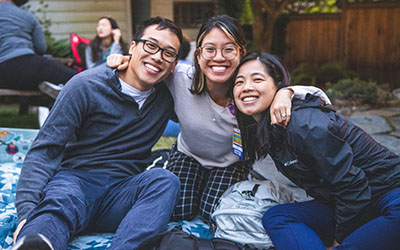
Systemic racism is a crisis that impacts our patients and community every day. As pediatricians, it is our responsibility to uphold the values of justice, inclusion and equity. Our pediatric residency at the University of Washington/Seattle Children’s Hospital is committed to fostering an environment of inclusion that values underrepresented minorities in medicine (URMs), including members of our community who identify as Black, Indigenous and People of Color (BIPOC) and lesbian, gay, bisexual, transgender, gender diverse, intersex, queer, asexual, questioning and allies (LGBTQIA+).
What started in 2003 as specific efforts in recruitment and retention of URMs to our program and hospital has grown into an intentional curriculum and environment surrounding inclusion and health equity. Advancing anti-racism is core to our mission and to our duty as child advocates. Our residency program and hospital have several programs to support these efforts to promote health justice for our patients and their families, our trainees, staff and faculty.
Residency Diversity Committee (DComm)
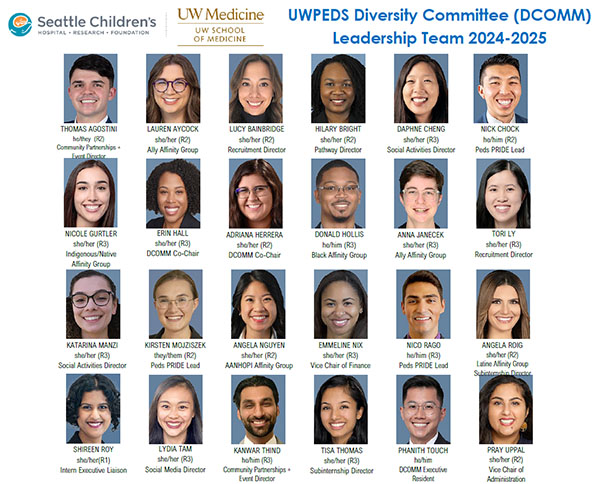
The Diversity Committee (DComm) of the University of Washington/Seattle Children’s Pediatric Residency Program is a resident-led and faculty-mentored team that is committed to championing justice, equity, diversity, inclusion (JEDI), and antiracism. (Read more about the leadership team [PDF].) We carry out these goals through recruitment activities, community building, mentorship, advocacy, education, and outreach. Additionally, we build protected spaces for minoritized residents as they undergo training as physicians. In doing so, we hope to build inclusivity while celebrating people’s intersectional identities. These include race, ethnicity, cultural backgrounds, national origin, language, gender identity, sexuality, socio-economic status, disability, religion, history of immigration and other identities.
DComm is open to all members of the UW Pediatrics residency program. We work in parallel and in conjunction with our UW Department of Pediatrics Faculty JEDI Committee.
We carry out our goals through recruitment and retention activities, planning of a funded diversity sub-internship, community and mentorship events, protected safe spaces for minoritized groups and race-based caucusing and advocacy efforts in our local institutions and communities. Some of our projects include:
- Active participation in the recruitment of a diverse class of talented and unique individuals
- Providing safe spaces to process sensitive resident experiences related to diversity, equity and inclusion
- Mentorship opportunities and social events to build community between trainees and faculty, in partnership with the Faculty Justice, Equity, Diversity and Inclusion (JEDI) Committee
- Active leadership within Network of Underrepresented Residents and Fellows (NURF)
- Collaboration with Graduate Medical Education at Seattle Children’s on projects and issues related to diversity and inclusion, such as an antiracism action plan and microaggression reporting system
- Partnership with medical students on service and advocacy projects in the greater Seattle area
- Support of pathway programs for URM students interested in health science careers
INCLUDE (Inclusion, Cultural Humility, Diversity and Equity) Curriculum
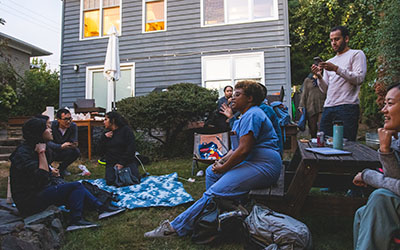
Implemented in 2017, our INCLUDE longitudinal curriculum covers approximately 25-30 hours of material each year, including skill building, didactics and small group discussions. These sessions include case conferences, book clubs, journal clubs and humanism sessions.
During intern year, there is dedicated time for EDI training, including sessions on cultural humility, the historical context of racism in medicine and addressing microaggressions. Additionally, didactics are held throughout the year on issues related to health care equity, such as trauma-informed care, LGBTIQ+ health, religion in medicine, immigration law and other topics.
Health Equity Rounds
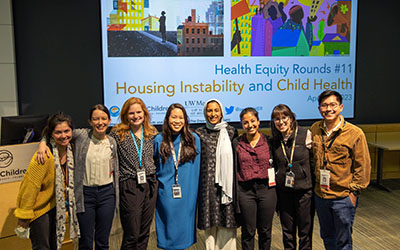 Developed by a group of current residents in 2019, Seattle Health Equity Rounds (HER) is a series of interdisciplinary case-based discussions at Seattle Children’s Hospital that explores issues of equity, bias, and racism that play out in medical settings today. As resident physicians, we have partnered with nurses, social workers and the larger healthcare workforce at Seattle Children's to lead and facilitate conferences intended to open dialogue across disciplines. Participants discuss how race and equity affect the care of our patients and the way that we work with one another. We hope these conferences and subsequent dialogue lead to important policy and behavioral change in our workforce that will advance equity for our patients, their families and each other.
Developed by a group of current residents in 2019, Seattle Health Equity Rounds (HER) is a series of interdisciplinary case-based discussions at Seattle Children’s Hospital that explores issues of equity, bias, and racism that play out in medical settings today. As resident physicians, we have partnered with nurses, social workers and the larger healthcare workforce at Seattle Children's to lead and facilitate conferences intended to open dialogue across disciplines. Participants discuss how race and equity affect the care of our patients and the way that we work with one another. We hope these conferences and subsequent dialogue lead to important policy and behavioral change in our workforce that will advance equity for our patients, their families and each other.
HER has four broad goals:
- To understand and learn concepts and language used in health equity, such as implicit bias and structural racism
- To identify implicit bias and structural racism in clinical scenarios
- To describe and understand the historical context and present-day role of structural racism in the community and at our own institution
- To take time to reflect on bias at our institution and to develop strategies to combat structural racism at the institutional level and across disciplines
Our HER conferences reach between 200-350 hospital workforce members each session. Past topics have included reviewing bias towards Indigenous families and the history of Indigenous family separation; racial bias towards families with parental substance use and disproportionate calls to Child Protective Services; racial bias in calls for security and policing in the hospital; and inequitable care for families who speak a primary language other than English.
Follow us on X (@SeattleHER) and access our Seattle Health Equity Rounds Glossary to learn more.
Empowered Voices
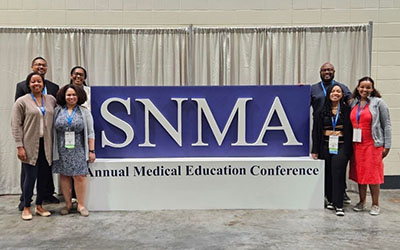
Our residents use their voices and positions as medical professionals to improve the health and well-being of our patients and communities of color. Some examples of ways our residents are currently involved in advocacy include:
- AAP Representatives work directly with the Washington Chapter of the AAP to lead advocacy efforts within our residency program and serve as experts on state legislative issues related to child health.
- Over the past few years, residents collectively wrote an Anti-Racism Call to Action statement to hospital leadership that included resident experiences and concrete action steps to aid in improving the hospital environment for our minority patients, trainees, staff and faculty.
- Residents helped to organize a university-wide silent demonstration in conjunction with NURF.
- Trainees participated in the Seattle Doctors for Justice March, which drew more than 10,000 healthcare workers to downtown Seattle in June 2020.
- Publication of an op-ed addressing the daily effects of systemic racism on child health.
Health Equity Track
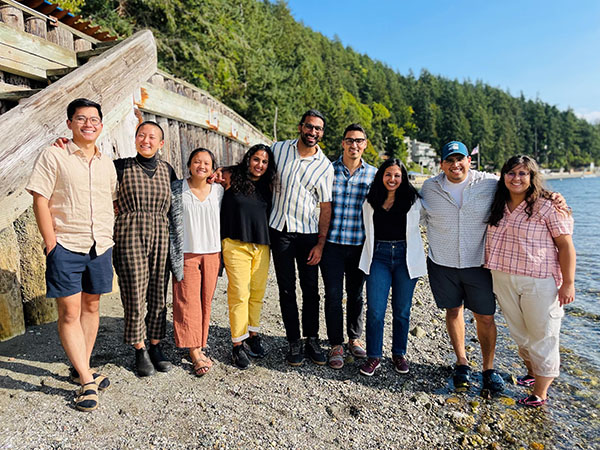
While all residents participate in the EDI curriculum and advocacy opportunities, we matched our inaugural class for the Health Equity Track (HET) in 2020. The mission of HET is to train a diverse group of pediatric residents to advance health equity for children and adolescents through collaborative clinical care, community partnership, advocacy and education.
Funded Visiting Electives for Students Underrepresented in Medicine
The University of Washington /Seattle Children’s Hospital is excited to solicit applications for our funded visiting rotation! As the first pediatric-specific visiting diversity student program was created in 2005, we are excited to invite you to join us!
Program description
Funded medical student rotations in Pediatrics will be available at Seattle Children's Hospital from June through December 2024 for qualified applicants who are planning to apply to pediatric residencies and who are committed to contributing to a physician workforce that prioritizes and celebrates diversity, equity and inclusivity. This includes students with a demonstrated interest and participation in diversity programs, those who have overcome significant barriers in their pathway to medicine, those who are involved in activities and/or organizations that serve diverse and/or marginalized communities (e.g., Association of American Indian Physicians, Asian Pacific American Medical Student Association, Latino Medical Student Association, Student National Medical Association, etc.) and those who attend(ed) institutions that have historically served marginalized learners (e.g., Hispanic-Serving Institutions, Historically Black Colleges and Universities, Tribal Colleges and Universities, etc.). Students of all backgrounds are invited to apply. Funding includes up to $2,500 for reimbursement of travel, housing, meals and application fees.
Students will spend four weeks either on one of our inpatient medicine teams (General Medicine, Hematology-Oncology) or as a Nephrology elective student caring for patients in the clinic and on the wards. Other subspecialty electives may be considered based on availability. Students completing an acting internship will do three weeks of day shifts and one week of night shifts. Elective students will spend time in subspecialty clinics and on inpatient consult teams.
Visiting students will be paired with a resident and faculty mentor based on their stated interests and interact with residents and faculty who are part of our Residency Diversity Committee. In addition, applicants chosen for the program are guaranteed an interview for our residency in Pediatrics at the UW.
Applications for the 2024 Funded Electives are closed. Please check back for updates in 2025.
This program is open to applicants who are in their final year at a Liaison Committee on Medical Education–accredited or Education Department of the American Osteopathic Association–accredited medical school. Students attending international medical schools or schools that are not accredited by the above organizations should refer to these policies. Applicants must provide the following:
- Statement of interest in pediatrics and the visiting rotation at Seattle Children's Hospital (one-page limit). Consider the following prompts when writing:
- What personal attributes, life experiences, strengths and/or challenges impact your future as a physician in interacting effectively with diverse patients and your peers?
- Describe an experience in which you have encountered or confronted inequities in the health sciences.
- Discuss your motivation and interest in pediatrics, considering how you will contribute to diversity, equity and/or inclusivity in the field.
- One letter of recommendation, preferably from a pediatric attending
- Curriculum vitae
- Official medical school transcript
- Completed Diversity Funded Elective Application (DOCX)
- Completed Visiting Student Learning Opportunities application
Applications will be reviewed by members of the Residency Diversity Committee. Applicants who are accepted for a funded rotation must also apply to be accepted by the UW Visiting Student Program. Interested students should review that program's requirements.
Applicants not selected for the funded rotation may still apply for unfunded acting internships and electives.
We are happy to answer questions regarding our program and connect you with individuals with shared interest from our residency diversity committee. Please email us with questions (subject line: Diversity Visiting Elective).
Visiting Elective Program in Pediatric Surgery for Underrepresented in Medicine Medical Students
This visiting elective program is a unique opportunity for fourth-year medical students who have overcome difficult paths to surgery (e.g., overcoming racism, sexism, xenophobia or poverty, among other forms of marginalization) and are interested in pursuing a career in general surgery or pediatric surgery and/or pediatric surgery subspecialties (transplant, colorectal, oncology, etc.)
Program description
This elective will be awarded to two fourth-year students annually. The elective is a one-month experience in the summer and fall months. Students will spend this time with the Pediatric General Surgery service at Seattle Children’s Hospital, a premier free-standing children’s hospital and one of the original 15 pediatric surgery training programs in the United States. The student will be integrated into the service, including rounding on the ward patients, spending time in the operating room and participating in educational conferences. The experience can be tailored to any of the student’s specific clinical interests. In addition to clinical exposure, this experience will provide exposure to mentorship and longitudinal assistance with career development from our Pediatric Surgery faculty and residents. A stipend of $2,500 is included for travel, housing expenses and meals.
Program goals
- Encourage students to consider a career in pediatric surgery.
- Enhance student awareness of opportunities in academic medicine.
- Provide specific mentoring and networking for students who have navigated a difficult path to a career in surgery.
Applicants for these funded positions should demonstrate academic excellence, leadership and extracurricular experience, and demonstrate a commitment to advancing and advocating for diversity and equity in the field of surgery, including, but not limited to, activities with established organizations (e.g., Student National Medical Association, Latino Medical Student Association, Association of American Indian Physicians, Society of Black Academic Surgeons, Latino Surgical Society, Association of Out Surgeons and Allies), volunteer work, academic/research pursuits or current attendance/graduation from minority serving institutions (e.g., Historically Black Colleges and Universities, Hispanic Serving Institutions, tribal colleges and universities). Those who apply to the program should be students who are highly motivated to pursue a career in general surgery and have interest in pediatric surgery. Students must be in good standing at an LCME-accredited United States medical school. Applicants must provide the following:
- Brief statement of interest in pediatric surgery and the visiting rotation at Seattle Children’s Hospital (1,000-word limit) reviewing your reasons for wanting to participate, your career goals and how this experience would enhance those goals
- Complete the VSLO application for the UW School of Medicine and apply to SURG 683.
- Current curriculum vitae
- One letter of recommendation from a clinical faculty member
- Medical school transcript
- USMLE Step 1 score. If already taken, also submit a Step 2 score report.
- Completed Diversity Funded Elective Application (DOCX)
We will begin accepting applications on March 3 for the 2025-26 academic year. Application materials can be emailed to caitlin.smith@seattlechildrens.org. Applicants will be notified by April 25 of acceptance.
Visiting Elective Program in Pediatric Surgery for Underrepresented in Medicine Surgical Residents
This visiting elective scholarship program is a unique opportunity for general surgery residents who have overcome difficult paths to surgery (e.g., overcoming racism, sexism, xenophobia or poverty, among other forms of marginalization) and are interested in pursuing a career in general surgery or pediatric surgery and/or pediatric surgery subspecialties (transplant, colorectal, oncology, etc.)
Program description
This elective will be awarded to two general surgery residents annually. The elective is a one-month experience in October and April. General surgery residents should be in their fourth year (or research years as a more junior resident) to apply.
Residents will spend this time with the Pediatric General Surgery service at Seattle Children’s Hospital, a premier free-standing children’s hospital and one of the original 15 pediatric surgery training programs in the United States. The resident will be integrated into the service, including rounding on the ward and ICU patients, spending time in the operating room and participation in educational conferences. The resident will serve as acting junior Pediatric Surgery fellow for these months. In addition to clinical exposure, this experience will provide exposure to mentorship and longitudinal assistance with career development from our Pediatric Surgery faculty.
The resident’s home institution will still be responsible for resident salary, benefits and liability coverage. An additional stipend of $2,500 is included for travel, housing expenses and meals and will be disbursed at the end of the rotation.
Program goals
- Increase exposure to pediatric surgery for residents underrepresented in general surgery.
- Enhance resident awareness of opportunities in academic medicine.
- Provide specific mentoring and networking for networking for students who have navigated a difficult path to a career in surgery.
Applicants for these funded positions should demonstrate academic excellence, leadership and extracurricular experience, and demonstrate a commitment to advancing and advocating for diversity and equity in the field of surgery, including, but not limited to, activities with established organizations (e.g., Student National Medical Association, Latino Medical Student Association, Association of American Indian Physicians, Society of Black Academic Surgeons, Latino Surgical Society, Association of Out Surgeons and Allies), volunteer work, academic/research pursuits or current attendance/graduation from minority serving institutions (e.g., Historically Black Colleges and Universities, Hispanic Serving Institutions, tribal colleges and universities).
Those who apply to the program should be residents who are highly motivated to pursue a career in pediatric surgery. Residents must be in good standing at an ACGME-accredited United States general surgery residency program. Applicants must provide the following:
- Brief statement of interest in pediatric surgery and the visiting rotation at Seattle Children’s Hospital (1,000-word limit) reviewing your reasons for wanting to participate, your career goals and how this experience would enhance those goals
- Current curriculum vitae
- Two letters of recommendation from clinical faculty members
- Completed Diversity Funded Elective Application (DOCX)
We began accepting applications March 3 for the 2025-2026 academic year. Application materials should be emailed directly to caitlin.smith@seattlechildrens.org. Applicants will be notified by April 25 of acceptance.
Additional Partnerships
- Seattle Children’s Center for Diversity and Health Equity
- Department of Pediatrics Justice, Equity, Diversity, and Inclusion (JEDI) Committee
- Jason Deen, MD, Assistant Professor of Pediatrics in the Division of Cardiology, serves as Associate Vice Chair for Equity, Diversity, and Inclusion in the Department of Pediatrics
- UW Network of Underrepresented Residents and Fellows (NURF). Instagram @UW_NURF
- UW Center for Health Equity, Diversity, and Inclusion
